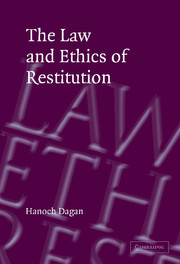Book contents
- Frontmatter
- Contents
- Acknowledgments
- Table of cases
- Table of statutes and treaties
- 1 Introduction
- 2 Preventing unjust enrichment
- 3 Mistakes
- 4 Other-regarding conferrals of benefits
- 5 Self-interested conferrals of benefits
- 6 Restitution in contexts of informal intimacy
- 7 Wrongful enrichments
- 8 Restitution in a contractual context
- 9 Restitution in bankruptcy
- 10 Reasons for restitution
- Bibliography
- Index
9 - Restitution in bankruptcy
Published online by Cambridge University Press: 05 July 2009
- Frontmatter
- Contents
- Acknowledgments
- Table of cases
- Table of statutes and treaties
- 1 Introduction
- 2 Preventing unjust enrichment
- 3 Mistakes
- 4 Other-regarding conferrals of benefits
- 5 Self-interested conferrals of benefits
- 6 Restitution in contexts of informal intimacy
- 7 Wrongful enrichments
- 8 Restitution in a contractual context
- 9 Restitution in bankruptcy
- 10 Reasons for restitution
- Bibliography
- Index
Summary
Most of this book is dedicated to showing that the normative underpinnings of various restitutionary doctrines can, and should, inform the future evolution of the law. It is my hope that by now the reader shares (or at least appreciates) the potential of this optimistic posture, which was presented in chapter 1 and applied thereafter. This chapter, which focuses on the last paradigm case of restitution, shows the limits of such an enterprise.
Traditional doctrine grants restitution claimants in bankruptcy – creditors who can identify their property (or trace its proceeds) in the debtor's estate, and show that it was obtained as a consequence of a voidable transfer (in the typical case: of the debtor's fraud) – a valuable trump. If this restitution claimant succeeds in asserting that such an identifiable asset is subject to a constructive trust in her favor, she can simply reclaim what is deemed to be equitably hers. Thus, this fortunate claimant gets, in effect, a priority, escaping the destiny of other unsecured creditors whose claims are only partly satisfied.
This important role of restitution in bankruptcy has recently become a subject of fierce debate among courts and commentators alike. Critics insist that because constructive trust is a remedy, imputing restitution claimants with equitable ownership is but a fiction, and a rather awkward one, given the wonderful intricacies of transactional tracing.
- Type
- Chapter
- Information
- The Law and Ethics of Restitution , pp. 297 - 327Publisher: Cambridge University PressPrint publication year: 2004
- 1
- Cited by



